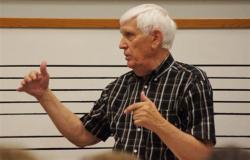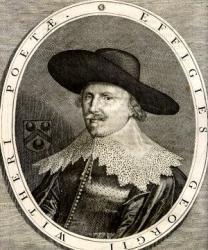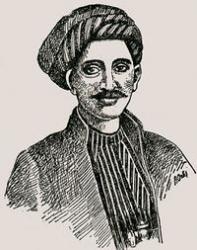Planning worship?
Check out our sister site, ZeteoSearch.org,
for 20+ additional resources related to your search.
- |
User Links
Person Results
Jack Boyd

b. 1932 Arranger of "ABERYSTWYTH" in Great Songs of the Church (Revised) Jack Arthur Boyd (b. Indianapolis, Indiana, February 9, 1932) was the music editor of *Great Songs of the Church, Revised*, published by ACU Press in 1986. He earned a B.S. degree in music education from Abilene Christian University, a masters degree in music composition and theory from the University of North Texas, and a Ph.D. in choral literature from the University of Iowa. Boyd edited *Children, Rejoice!* (Sweet, 1979) and he authored *Rehearsal Guide for the Choral Director* (Parker, 1970) and *Leading the Lord's Singing* (Quality, 1981). He is a member of Churches of Christ and lives in Abilene, Texas.
Monty Lynn
Jack Boyd
William Bright

1824 - 1901 Person Name: W. Bright (1824-1901) Author of "Thou, the Christ for ever one" in A Missionary Hymn Book Bright, William, D.D., born at Doncaster, Dec. 14, 1824, and educated at University College, Oxford, where he graduated B.A. (first class in Lit. Hum.) in 1846, M.A. in 1849. In 1847 he was Johnson's Theological Scholar: and in 1848 he also obtained the Ellerton Theological Essay prize. He was elected Fellow in 1847, and subsequently became Tutor of his College. Taking Holy Orders in 1848, he was for some time Tutor at Trinity College, Glenalmond; but in 1859 he returned to Oxford, and in 1868 became Regius Professor of Ecclesiastical History and Canon of Christ Church. His publications include:—
(1) Ancient Collects, selected from various Rituals, 1857, 2nd ed., 1862; (2) History of the Church from the Edict of Milan to the Council of Chalcedon, 1860; (3) Sermons of St. Leo the Great on the Incarnation, translated with notes, 1862; (4) Faith and Life, 1864-66; (5) Chapters of Early English Church History, 1877; (6) Private Prayers for a Week; (7) Family Prayers for a Week; (8) Notes on the Canons of the First tour Councils. He has also edited (9) Eusebius' Ecclesiastical History, 1872; (10) St. Athanasius's Oration against the Arians, &c, 1873; (11) Socrates' Ecclesiastical Hist.; (12) with the Rev. P. G. Medd, Latin Version of the Prayer Book, 1865-69. His poetical works are, (13) Athanasius and other Poems, by a Fellow of a College, 1858; and (14) Hymns & Other Poems, 1866; revised and enlarged, 1874. The last two works contain original hymns and translations. To the hymn-books he is known through his original compositions, seven of which are given in the revised edition of Hymns Ancient & Modern and some are found elsewhere. In addition to “And now the wants are told," and "At Thy feet, O Christ, we lay" (q.v.), there are:—
1. And now, 0 Father, mindful of the love. Holy Communion. Published in Hymns Ancient & Modern1875. Part of a composition in his Hymns, &c.
2. Behold us, Lord, before Thee met. Confirmation. Printed in the Monthly Packet, Nov. 1867, and, in a revised form, in the Appendix to Hymns Ancient & Modern, 1868.
3. How oft, O Lord, Thy face hath shone. St. Thomas. Published in Hymns Ancient & Modern, 1875.
4. Once, only once, and once for all. Holy Communion. Written in 1865, and published in his Hymns, &c, 1866, in 6 stanzas of 4 lines. It was given in the Appendix to Hymns Ancient & Modern, 1868; the new edition, 1875, and several other collections.
5. We know Thee, Who Thou art. Prayer after Pardon. Written in 1865, and published in his Hymns , &c, 1866, in 5 stanzas of 4 lines. It was included in the Appendix to Hymns Ancient & Modern, 1868, &c.
Canon Bright's hymns merit greater attention than they have received at the hands of compilers. He died March 6, 1901.
-- John Julian, Dictionary of Hymnology (1907)
===================
Bright, William, p. 182, i. Other hymns in common use are:—
1. God the Father, God the Son. Litany of the Resurrection. Second stanza, "Risen Lord, victorious King." From Iona, &c, 1886.
2. Pie sat to watch o'er customs paid. St. Matthew. In the 1889 Supplemental Hymns to Hymns Ancient & Modern.
3. Holy Name of Jesus. Name of Jesus. From Iona, &c., 1886.
4. Now at the night's return we raise. Evening. Rugby School Hymn Book, 1876, and others.
5. Thou the Christ for ever one. Mission to the Jews. In the 1889 Supplemental Hymns to Hymns Ancient & Modern.
--John Julian, Dictionary of Hymnology, Appendix, Part II (1907)
William Bright
Martin E. Leckebusch
b. 1962 Author of "Listen, Lord, to My Complaint" in Christian Worship
Martin E. Leckebusch
María Eugenia Cornou
b. 1969 Person Name: María Eugenia Cornou, b. 1969 Translator (st. 4) of "Jesus, Lover of My Soul (Cariñoso Salvador)" in Santo, Santo, Santo
María Eugenia Cornou
George Wither

1588 - 1667 Person Name: George Wither (1588-1667) Author of "Come, oh come, in pious lays" in The Oxford Hymn Book Wither, George, or Wyther—spelled in both ways by himself, the first usually, the second occasionally, e.g. in Prince Henrie's Obsequies (1612), and erroneously Withers, was born on June 11th, 1588, at Bentworth, near Alton, Hampshire. He was the only son of George Wither, of Bentworth. His early education was at the Grammar School of Colemore or Colemere, under its celebrated master; John Greaves. After thorough training and discipline here he was entered in 1604 at Magdalen College, Oxford. His tutor was John Warner, subsequently D.D. and Bishop of Rochester. He had only been three years at the University when malicious and ignorant persons persuaded his father that more learning was not required. And so, as he modestly tells us in his Abuses Stript and Whipt (1613), he was withdrawn "without taking any degree," being now destined, as he moderately puts it, "for the plough," that is, for rustic employment on the paternal estate. This proved utterly uncongenial. He is found next at one of the Inns of Chancery, afterwards at Lincoln's Inn, and intimate with William Browne, the poet, of Britannia's Pastorals. His title-pages from 1617 to 1620 self-describe him as "Gentleman,” and as "of the Societie of Lincoln's Inne" (Fidelia (1617), and 1st Psalme (1620), and Workes (1620)). But Anthony a-Wood informs us:—
"still his geng after things more smooth and delightful, he did at length make himself known to the world (after he had taken several rambles therein) by certain speci¬mens of poetry, which being dispersed in several hands, he became shortly after a public author and most admired by some in that age for his quick advancement in that faculty " (Athenae. Oxon. s. n.).
How uncritical was this miserable criticism, will be understood when it is recalled that amongst these "certain specimens" was the Shepherds Hunting under the first form of "A new song of a young man's opinion of the difference between good and bad women" (Pepysian, ad Percy MS.), Prince Henries Obsequies (1612), Epithalamia (1612), and his stinging and patriotically outspoken Abuses Stript and Whipt. The last drew down upon him the wrath of the monarch (James i.) and nobles, and cast him prisoner into the Marshalsea. Four large editions within a year, and numerous others up to 1622 and continuously onward (exclusive of the reproductions in his Workes) was the answer of the People to the Upper Ten.
While in prison he wrote some of the most delicious of his verse. He likewise composed A Satyre to the King (1615). The wisest fool in Christendom was shrewd enough to perceive that it would be safer to make such a subject a friend than an enemy. He had deftly signed the dedication to the king "his Majesty's most loyall Subiect, and yet Prisoner in the Marshalsey." It procured him his release. From this time onward he was perpetually printing something, now in verse and now in prose, until the aggregate exceeded a hundred of books and pamphlets. There are several fairly accurate enumerations of them, e.g. British Bibliographer, i. 174-205, 305-32,417-40; ii. 17-32,378-91; Sir Egerton Brydges' Censuria and Restituta; Hazlitt's Bibliography (1867). The Spenser Society re¬printed a large portion of the Works in prose and verse; but there was really no editing and no annotation. His successive books are the main facts of Wither's life; yet was he an active member of the nation.
Spite of his hard usage and imprisonments, he was loyal as any cavalier. When Charles i. proceeded to declare and carry war into his native Scotland against the Covenanters in 1639, George Wither served his Majesty as a captain of horse and quarter-master of his regiment under the Earl of Arundel. How sorrowful the wrongheadedness of the king who compelled such a true man as Wither to forsake him and prefer the kingdom to the king, as many others who with pathetic reluctance became Roundheads! In 1641-2 he sold his hereditary estates and raised a troop of horse for the Parliament, in whose army he was promoted to be major. On his colours he carried this motto, Pro Rege, Lege, Grege. Having been taken prisoner by the Royalists, a good-humoured jest of Sir John Denham it is alleged saved his life, to wit, that "his Majesty really must not hang George Wither, for so long as he lives no one will account him [Sir John] the worst poet in England." He was set free. Not long after he was constituted by the Long Parliament a Justice of Peace in quorum for Hampshire, Surrey and Essex. This he held for six years, and afterwards was made by Cromwell Major-General of all the horse and foot in the County of Surrey. On the title-page of his Boni Ominis Votu (1656) in the British Museum there is a contemporary manuscript note, "lately made Master of the Statute Office." At the Restoration he was shamefully dealt with, and by a vote of the Convention Parlia¬ment, was committed to Newgate because of his Vox Vulgi —a noble piece of fiery and idiomatic English, and manly pleading for respect to pipular rights and liberties. For his Prisoner's Plea humbly offered (1661) he was again imprisoned, this time in the Tower. He married (Aubrey informs us) Elizabeth, eldest daughter of H. Emerson of South Lanuk, who, he says, was "a great wit and could write in verse too," and was of the same English Emersons from whom the great American Ralph Waldo Emerson descended. He had issue. He was at liberty when he died on 2nd May, 1667. Aubrey states that he was buried within the east doorway of Savoy Church in the Strand, having apparently lived near it, and either died in the church or in his own house (the phrasing being ambiguous).
James Montgomery, in his admirable Lectures on Poets and Poetry, thus sums up his estimate of him and them:—
"There are scattered throughout his multifarious and very unequal productions, many passages of great beauty and excellence. He was avowedly a Christian poet, though he frequently lost his Christian meekness in the heat of polemics; but his zeal carried with it every evidence of honesty; and he was a sufferer almost to martyrdom, both for his loyalty and his orthodoxy, in the troublous times in which he lived. That he was a poet can never be questioned by any reader who has taste and sensibility enough to understand and enjoy the exquisitely affecting confession of his obligations to the Muse. That he was a Christian will be as little questioned by those who are most extensively acquainted with the character of his religious compositions" (s. n.).
Archbishop Trench, in annotating a charming sacred song entitledVanished Blessing ("No voice which I did more esteem, Than music in her sweetest key," &c), thus annotates:—
"I have detached these two stanzas from a longer poem of which they constitute the only valuable portion[?]. George Wither (‘a most profuse pourer forth of English rhyme,' Philips calls him) was indeed so intolerable a power in verse, so overlaid his good with indifferent or bad, that one may easily forget how real a gift he possessed, and sometimes showed that he possessed" (Household Book of English Poetry, 1865).
Mrs. Masson says of him—"he is remembered now-a-days as pre-eminently the Puritan poet, whose irrepressible Muse made herself hsard even amid the din of civil war" (Three Centuries of English Poetr, p. 375). She quotes his delightful "Christmas" ("So now is come our joyfullest part"), and "Of Poesy" (which Milton did not disdain to utilize), and his "Shall I, wasting in despair." With reference to the "irrepressible Muse" of Wither, it is a felicitous characterisation however regarded, inasmuch as so "irrepressible " was he that he actually set up the types and printed off at least one of his bulkier books. Withers contributions to hymnology are to be found chiefly in the following:—
(a) Exercises Upon the First Psalme......(1620). At the close is a metrical paraphrase of Ecclcsiastes xii. 1-8; (b) Paraphrase on the Creed and the Lord's Prayer (in Workes 1620; separately 1688 and misasserted to be now “first printed“); (c) The Songs of the Old Testament, Translated into English Measures: preserving the Naturall Phrase and genuine Sense of the Holy Text ...... To every Song is added a new and easie Tune.....(1621); (d) The Hymnes and Songs of the Church (1623). This was published Cum Privilegio Regis Begalu . It was reprinted like c.; (e) The Psalmes of David translated as Lyrick Verse, according to the scope of the Original......(1632). Gutch had an autograph manuscript of an alleged different text of the versified Psalmes which passed into the Caesar Library; (f) A Collection of Emblemes, Ancient and Modern, quickened with Metrical Illustrations both Morall and Divine......(1635). This was a special favourite of Elia; (g) Haldviah; or Britans Second Remembrancer, bringing to Remembrance (in praisefull and poenitentiall Hymns, Spirituall Songs, and Morall-Odes......(1641). This was reprinted like c and d; (h) Three Graines of Spiritual Frankincense infused into Three Hymnes of Praise (1651).
It is discreditable to the Church of England, of whom he was a devoted son to the close of his life, and to Nonconformity alike, that many, very many more of his Hymnes and Spiritual Songs have not found their way into their hymnals. A critical yet sympathetic reader would easily find a golden sheaf of musical, and well-wrought sacred song. [Rev. A. B. Grosart, D.D., LL.D.]
-- Excerpts from John Julian, Dictionary of Hymnology (1907)
==================
Wither, G., p. 1289, i. Another of his psalm versions, "The Lord is King, and weareth" (Ps. xciii.), from his The Psalmes of David, &c, 1G32, is in the Hymn Book for the Use of Wellington College, 1902.
--John Julian, Dictionary of Hymnology, New Supplement (1907)
George Wither
D. Tecwyn Evans
Person Name: D. Tecwyn Evans (1876-1957) Translator of "Iesu, Cyfaill f'enaid cu (Jesus, Lover of my soul)" in Welsh and English Hymns and Anthems
D. Tecwyn Evans
Alan Gaunt
b. 1935 Person Name: Alan Gaunt (b. 1935) Author of "Body broken for our good" in Ancient and Modern
Alan Gaunt
Sarah Poulton Kalley
1825 - 1907 Person Name: Sarah Poulton Kalley (1825-1907) Translator of "Ó bondoso Salvador (1)" in Mil Vozes para Celebrar Born in Nottingaham, England in 1825. Married Scottish physician and missionary Robert Reid Kalley. Together they went to Brazil. She wrote many hymns and was instrumental in organizing Salmos e Hinos the first Brazilian evangelical hymnal in the Portuguese language, first used at Igreja Evangélica Fluminense in 1861.
Sarah Poulton Kalley
Nāşīf Yāzijī

1800 - 1871 Person Name: ناصيف اليازجي Author of "من يسوع المعتمد" in كتاب الترانيم الروحية للكنائس الإنجيلية Nasif al-Yaziji (March 25, 1800 – February 8, 1871) was a Lebanese author at the times of the Ottoman Empire and father of Ibrahim al-Yaziji. He was one of the leading figures in the Nahda movement. We was a poet, wrote and translated many hymns, and helped in translating the complete Bible into Arabic.
ناصيف بن عبد الله بن جنبلاط بن سعد اليازجي (25 مارس 1800 - 8 فبراير 1871)، أديب وشاعر لبناني ولد في قرية كفر شيما، من قرى الساحل اللبناني في 25 آذار سنة 1800 م في أسرة اليازجي التي نبغ كثير من أفرادها في الفكر والأدب، وأصله من حمص.
لعب دورا كبيرا في إعادة استخدام اللغة الفصحى بين العرب في القرن التاسع عشر، عمل لدى الأسرة الشهابية كاتبا وشارك في أول ترجمة الإنجيل والعهد القديم إلى العربية في العصر الحديث.
Nāşīf Yāzijī


 My Starred Hymns
My Starred Hymns


